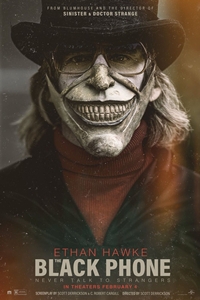The Black Phone (R) ★★★
 The Black Phone is a throwback to a time when horror was more about fear and suspense than blood and gore. Oh, there's some of the latter in the movie but far too little to sate the appetites of those who attend the genre purely to be entombed in viscera. An early conversation in the movie between the lead character Finney (Mason Thames) and his friend Robin (Miguel Cazarez Mora) extols the virtues of The Texas Chainsaw Massacre (The Black Phone is set in 1978); that seminal movie's influence on co-writer/director Scott Derrickson is evident. Also found during the course of the 100-minute film are nods to John Carpenter, Steven King, and even the Netflix retro hit, Stranger Things.
The Black Phone is a throwback to a time when horror was more about fear and suspense than blood and gore. Oh, there's some of the latter in the movie but far too little to sate the appetites of those who attend the genre purely to be entombed in viscera. An early conversation in the movie between the lead character Finney (Mason Thames) and his friend Robin (Miguel Cazarez Mora) extols the virtues of The Texas Chainsaw Massacre (The Black Phone is set in 1978); that seminal movie's influence on co-writer/director Scott Derrickson is evident. Also found during the course of the 100-minute film are nods to John Carpenter, Steven King, and even the Netflix retro hit, Stranger Things.
Ethan Hawke, who previously worked with Derrickson on Sinister, flips from being the victim to the perpetrator. He's The Grabber, a serial killer of children who abducts them and does unspeakable things to them, leaving behind few clues. The two police detectives working the case are baffled and Mason finds the noose tightening as a member of his little league vanishes followed by his best friend. Meanwhile, Mason's younger sister, Gwen (Madeleine McGraw), is having supernatural dreams about terrible things happening. Everything is set up for Mason's encounter with The Grabber.
Hawke wears a mask for most of the movie so we only occasionally glimpse his features. It's creepier that way. The Grabber keeps Mason trapped in a dungeon cell awaiting...not good things. On the wall in the cell is a black phone, which The Grabber dismisses as not working. But, when it rings, Mason answers. On the other end is one of the killer's previous victims, speaking from beyond the grave, seeking to provide Mason with information that might save his life. Or is it all some kind of elaborate trap? The Grabber is playing a game but Mason doesn't know the rules. On the outside, Gwen is desperate to find her brother but her predictive dreams are elusive and difficult to decipher.
Logical flaws aside (and there are a fair number of them – for example, wouldn't a community plagued by a child-abducting serial killer employ some kind of buddy system for children?), The Black Phone is tightly plotted and doesn't try to do too much. The secondary story involving Gwen is a little thin and feels more like a red herring than a necessary part of the story but it's used to break the tension. Spending 70 minutes trapped in the basement with Mason might be a little too harrowing. The meat of the story is well-handled and relies more on the terror resulting from the situation than on gratuitous bloodlettings. The supernatural elements are kept in check but are necessary to the development of the narrative.
The Black Phone works effectively with a small cast, two of whom – Thames and McGraw – are exceptional child actors (Thames was 13 at the time of filming; McGraw is a year and a half younger). Hawke manages to bring a lot of personality to his unbalanced character despite wearing the mask. After seeing him being terrorized in The Purge and Sinister, it's interesting to see him on the other side of things. The few supporting players, such as Jeremy Davies as Mason and Gwen's abusive, alcoholic father, are mostly in the background. This is mainly an opportunity for Thames, McGraw, and Hawke to shine.
Derrickson uses the prologue to establish a seemingly normal working class suburban locale before introducing the darker elements. As the mystery is gradually revealed, the level of tension builds. Occasional jump scares are employed along with longer, nail-biting sequences (such as one in which Mason attempts to open a combination lock).
With The Black Phone, Derrickson trades in the massive budget of Doctor Strange for something much smaller (Blumhouse bankrolled the movie). One gets the sense that the director wanted an opportunity to put his stamp on a movie rather than simply crank out another CGI-saturated product. The Black Phone is as solid a horror film as has come out post-pandemic and brings back memories of when “horror” meant more than an assembled sequence of shocks and blood-soaked clichés.
© 2022 James Berardinelli
To get the full Quicklook Films experience, uncheck "Enable on this Site" from Adblock Plus
box office top 10

Civil War Released: April 12, 2024 Cast: Kirsten Dunst, Wagner Moura 25.7M

Godzilla x Kong: The New Empire Released: March 29, 2024 Cast: Rebecca Hall, Brian Tyree Henry 15.5M

Ghostbusters: Frozen Empire Released: March 22, 2024 Cast: Paul Rudd, Carrie Coon 5.8M

Kung Fu Panda 4 Released: March 8, 2024 Cast: Jack Black, Viola Davis 5.5M

Dune: Part Two Released: March 1, 2024 Cast: Timothée Chalamet, Rebecca Ferguson 4.3M

Monkey Man Released: April 5, 2024 Cast: Dev Patel, Sikandar Kher 4.1M

The First Omen Released: April 5, 2024 Cast: Nell Tiger Free, Bill Nighy 3.8M

The Long Game Released: April 12, 2024 Cast: Dennis Quaid, Gillian Vigman 1.4M

Shrek 2 Released: May 19, 2004 Cast: Mike Myers, Eddie Murphy 1.4M

Sting Released: April 12, 2024 Cast: Alyla Browne, Ryan Corr 1.2M






